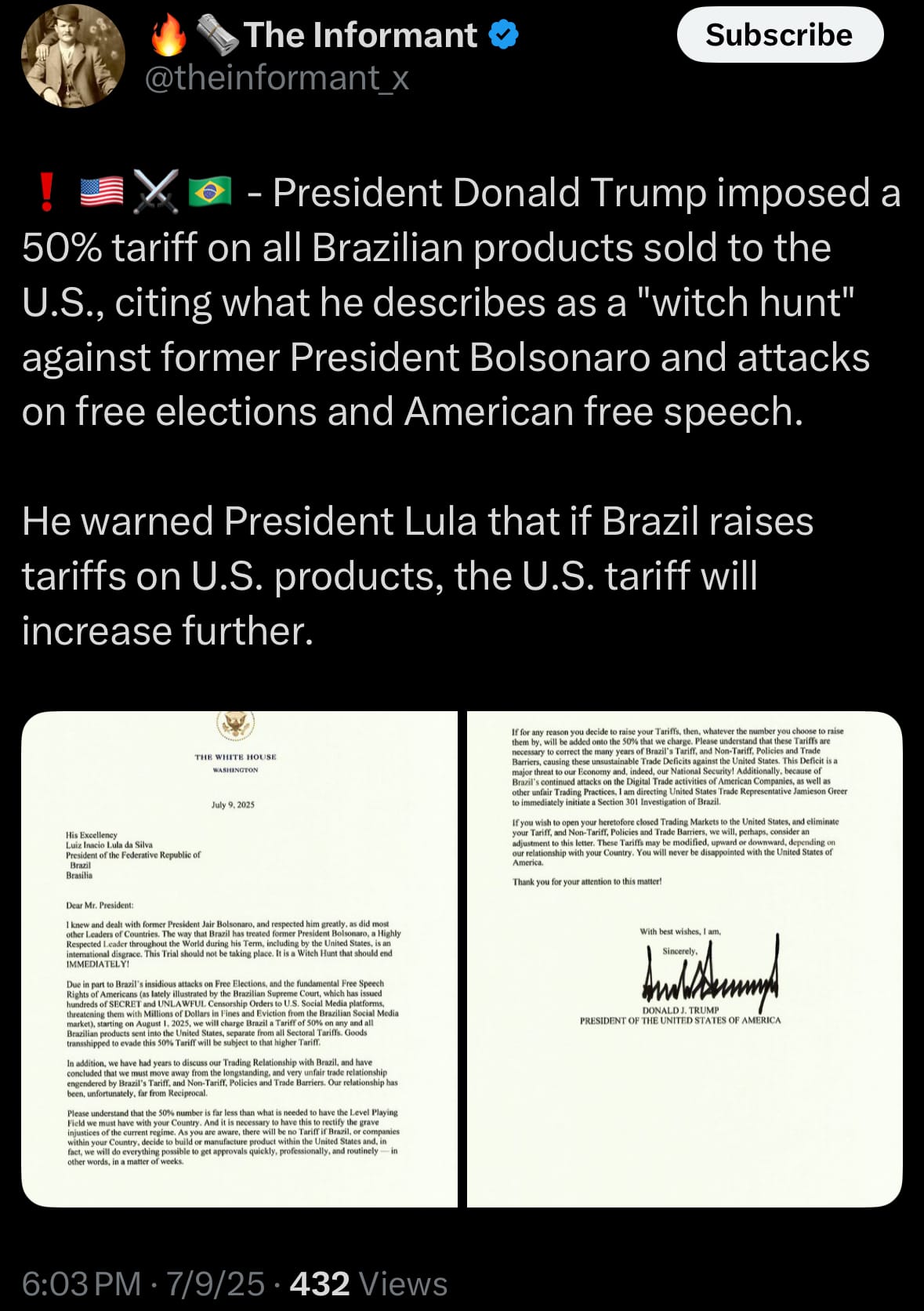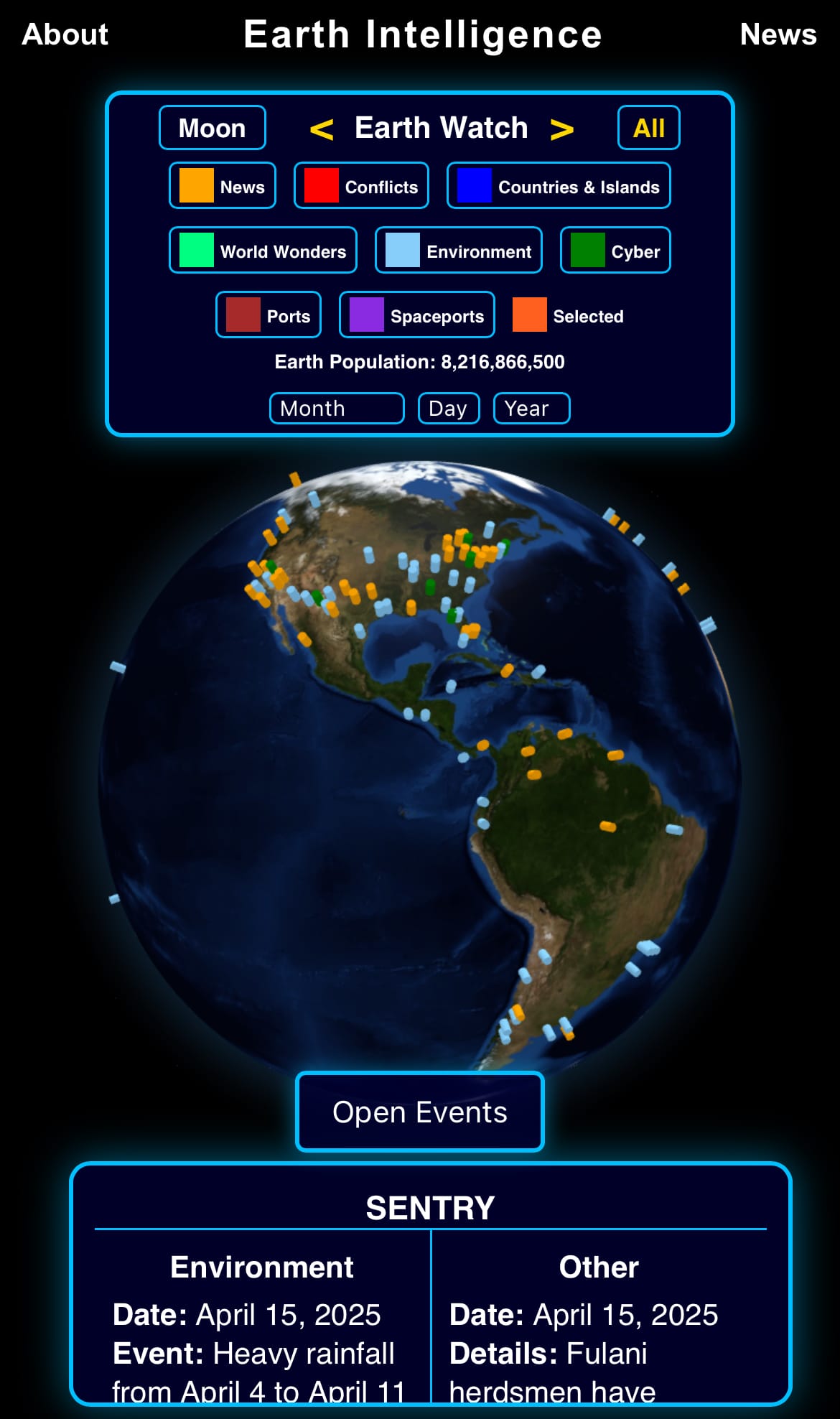Thursday☕️

Trending:
- Yesterday, July 9, 2025, U.S. President Donald Trump announced a 50% tariff on all Brazilian imports, effective August 1, 2025, unless Brazil negotiates a trade deal. This replaces a 10% tariff from April 2025 and applies to all Brazilian goods, with Trump citing Brazil’s legal actions against former President Jair Bolsonaro as a “Witch Hunt,” alongside issues like free speech, elections, and alleged censorship demands on U.S. social media. He also initiated an investigation into Brazil’s trade practices under Section 301 of the Trade Act of 1974, which could lead to further tariffs. Trump stated the tariff could be avoided if Brazil or its companies invest in U.S. manufacturing, a condition aimed at boosting American industry.

- The tariff could significantly impact Brazil, the U.S.’s 15th largest trading partner, with $92 billion in two-way trade and a $7.4 billion U.S. surplus in 2024. Brazil’s Vice President Geraldo Alckmin called Trump’s claims misinformation, defending Brazil’s independent judiciary, and suggested retaliatory tariffs under Brazil’s Law of Economic Reciprocity. This could spark a trade war, hurting Brazil’s exports, such as agriculture and copper, and raising costs for U.S. consumers and businesses. U.S. exporters to Brazil may also face losses if Brazil retaliates. With ongoing trade talks and the U.S. investigation, both nations face economic risks, and Brazil must navigate diplomatic or economic strategies to lessen the tariff’s effects.
Economics & Markets:
- Yesterday’s U.S. stock market:

- Yesterday’s commodity market:

- Yesterday’s crypto market:

Environment & Weather:
- July 9, 2025 – North Carolina is experiencing widespread flash flooding due to heavy rainfall from recent storms, including the remnants of Tropical Storm Chantal. As of 11:42 PM EDT, the National Weather Service has issued flash flood warnings for counties such as Wilkes, Yadkin, Alleghany, and Surry, with some warnings in effect until 3:30 AM on July 10, 2025. Up to 1.5 inches of rain have already fallen in affected areas, with an additional 2 inches possible at rates of 3-4 inches per hour. This has caused significant flooding in creeks, streams, urban areas, and low-lying regions, impacting locations like Yadkinville, North Wilkesboro, Elkin, and Jonesville. Earlier today, flooding was reported in Burlington, High Point, and Kernersville, where 62 water rescues occurred. In Chatham County, fatalities have been confirmed, highlighting the severity of the event amid the state’s ongoing recovery from previous floods.

- Authorities are urging residents to prioritize safety by avoiding flooded roads, where 12 inches of water can sweep away vehicles, and seeking higher ground in flood-prone areas. Additional precautions include avoiding electrical hazards and driving cautiously, particularly at night when visibility is reduced. Over 100 roads in Chatham County are flooded, including the collapsed State Highway 902, complicating travel and emergency response. The National Weather Service and local reports indicate that areas like Mebane, Greensboro, and Winston-Salem remain at risk. For the latest updates, residents should consult the National Weather Service (weather.gov) and trusted local sources to stay informed about road closures and safety advisories as conditions evolve.
Science & Technology:
- Yesterday, July 9, 2025, xAI released Grok 4, its newest AI model, during a livestream on X. Grok 4 comes in two versions: a standard model for everyday tasks and Grok 4 Heavy for tougher problem-solving. Right now, only X Premium+ users and those with access to xAI’s API can use it, with early signs of it appearing in xAI’s system. A full public release is planned soon. Tests show it scoring 45% on Humanity’s Last Exam (a tough reasoning test), 87–88% on GPQA (science problems), 72–75% on SWE-Bench (coding), 95% on AIME (math), and 61.9% on USAMO-25 (advanced math). These results beat models like OpenAI’s o3 (26% HLE), GPT-4o (53.6% GPQA), and Google’s Gemini 2.5 Pro (34.5% USAMO). However, the scores aren’t independently checked, and xAI didn’t share some competitors’ results, like Claude 4 Opus’s coding scores.

- Grok 4 is great at solving complex problems, writing code, and pulling real-time info from X. Compared to models like GPT-4o, Gemini 2.5 Pro, and Anthropic’s Claude 3.7 Sonnet, Grok 4 is faster at reasoning but can’t handle as much text at once. On the same day, July 9, 2025, Linda Yaccarino stepped down as X’s CEO after two years, having started in May 2023 following Elon Musk’s $44 billion purchase of the platform, then called Twitter. She helped rebuild X’s advertising business, kept it a top U.S. social app, and added features like a TV app, a Visa payment system, and deals with the NFL and NBA. With no new CEO named and xAI’s $33 billion acquisition of X in March 2025, X’s next steps depend on new leadership, AI tools like Grok, and to achieve Musk’s goal of an “Everything App.”
Statistic:
- Countries ranked by market capitalization of their public companies:
- 🇺🇸 United States: $64.172T
- 🇨🇳 China: $9.347T
- 🇯🇵 Japan: $5.547T
- 🇮🇳 India: $4.525T
- 🇬🇧 United Kingdom: $4.005T
- 🇨🇦 Canada: $3.358T
- 🇫🇷 France: $3.235T
- 🇩🇪 Germany: $3.021T
- 🇨🇭 Switzerland: $2.653T
- 🇸🇦 Saudi Arabia: $2.463T
- 🇹🇼 Taiwan: $2.149T
- 🇦🇺 Australia: $1.776T
- 🇳🇱 Netherlands: $1.488T
- 🇰🇷 South Korea: $1.448T
- 🇸🇪 Sweden: $1.215T
- 🇮🇪 Ireland: $1.102T
- 🇪🇸 Spain: $1.096T
- 🇦🇪 United Arab Emirates: $1.080T
- 🇮🇹 Italy: $1.056T
- 🇭🇰 Hong Kong: $1.023T
- 🇧🇷 Brazil: $799.82B
- 🇩🇰 Denmark: $713.21B
- 🇸🇬 Singapore: $618.37B
- 🇮🇱 Israel: $479.40B
- 🇲🇽 Mexico: $413.77B
History:
- The United States Congress was established in 1789 under the U.S. Constitution, designed as a bicameral legislature to balance competing interests in the fledgling nation. The House of Representatives, with seats apportioned by population, favored larger states, while the Senate, granting two seats per state, ensured smaller states’ influence, a structure born from the Connecticut Compromise at the 1787 Constitutional Convention. The First Congress convened in New York City’s Federal Hall, passing the Bill of Rights in 1791 to safeguard individual liberties and creating the framework for the federal judiciary through the Judiciary Act of 1789. It also established executive departments, like the Treasury, and imposed tariffs to fund the government. Throughout the early 19th century, Congress grappled with sectional tensions over slavery, trade, and territorial expansion. The Missouri Compromise of 1820, admitting Missouri as a slave state and Maine as free, exemplified its role in mediating North-South conflicts. The 1830s and 1840s saw fierce debates over tariffs, Native American removal, and the Mexican-American War, with Congress asserting its war powers and shaping national borders. By the 1850s, compromises like the Kansas-Nebraska Act failed to quell rising tensions, culminating in the Civil War.
- Post-Civil War, Congress spearheaded Reconstruction, fundamentally reshaping the nation. The 13th (1865), 14th (1868), and 15th (1870) Amendments abolished slavery, guaranteed citizenship rights, and protected voting rights, respectively, though enforcement waned by the 1870s. The late 19th century saw Congress expand federal infrastructure through railroad subsidies and land grants, while debates over monetary policy—gold versus silver—reflected agrarian and industrial divides. The Progressive Era (1890s–1920s) ushered in reforms like the 16th Amendment (1913) for income tax and the 19th Amendment (1920) for women’s suffrage, alongside antitrust laws to curb monopolies. The Great Depression prompted the New Deal in the 1930s, with Congress authorizing programs like Social Security and the Works Progress Administration to combat economic collapse. During World War II and the Cold War, Congress bolstered defense through measures like the GI Bill and NATO ratification, while the 1960s Civil Rights Act and Voting Rights Act addressed systemic racism. Since the late 20th century, Congress has faced growing partisanship, evident in budget standoffs, impeachment proceedings, and stalled legislation. Its war powers have often yielded to executive dominance, as seen in post-9/11 conflicts. Today, Congress remains a crucible for national debates, its history reflecting both democratic triumphs and persistent gridlock.
Image of the day:

Thanks for reading!
Earth is complicated, we make it simple.
Click image to view the Earth Intelligence System:



Support/Suggestions Email:
earthintelligence@earthintel.news




